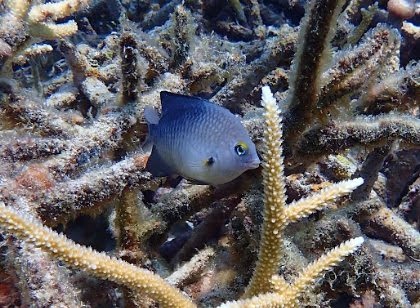Research Symposium
24th annual Undergraduate Research Symposium, April 3, 2024
Noah Peacock Poster Session 4: 2:45 pm - 3:45 pm/4

BIO
My name is Noah Peacock and I am an undergraduate researcher and AAUS Scientific diver with the FSUCML Academic Dive Program. I have had the pleasure of working alongside Allie Blanchette as a UROP student focusing on damselfish behavior, as well as Mariana Fuentes for vessel strike surveys on the analysis of sea turtle foraging behaviors. My passion for research and behavioral ecology has led me to become an established member of the FSU Coastal Marine Lab. I look forward to pursuing a career in marine conservation and furthering my skillsets within the field of marine research.
Comparing threespot damselfish behavior on coral types Acropora cervicornis and Orbicella spp.
Authors: Noah Peacock, Allie BlanchetteStudent Major: Biological Sciences
Mentor: Allie Blanchette
Mentor's Department: Biological Sciences Mentor's College: College of Arts and Sciences Co-Presenters: Sofia Lara
Abstract
Farmer damselfish (family: Pomacentridae) are a functional group of territorial herbivorous coral reef fish. They create algae farms by chasing away other herbivores and biting at live coral tissue to expand their territories. Damselfish can vary in how aggressively they defend their territories based on habitat quality. In the Caribbean, the endangered branching coral Acropora cervicornis is considered the preferred habitat for the threespot damselfish Stegastes planifrons. Our objective was to determine if threespot damselfish exhibit different farming behaviors on A. cervicornis versus a common non-branching coral Orbicella spp. To do this, a group of 2-3 divers placed cameras 1m away from damselfish territories across 9 sites in Bonaire, Caribbean Netherlands. These cameras recorded 30 minute videos that were then annotated on the behavioral observation software Boris. We found that there was no significant difference between coral types on either their territory maintenance behavior or their aggressive territoriality behavior. We also found that there is a positive correlation between damselfish density and both territory maintenance and chase behaviors. Damselfish are considered, by many restoration groups in the Caribbean, as stressors for the reef. Therefore we care about the relationship between damselfish and the coral because we can try to determine how their presence may affect coral such as Acropora cervicornis, a critically endangered species.
Keywords: Damselfish, Aggression, Coral


